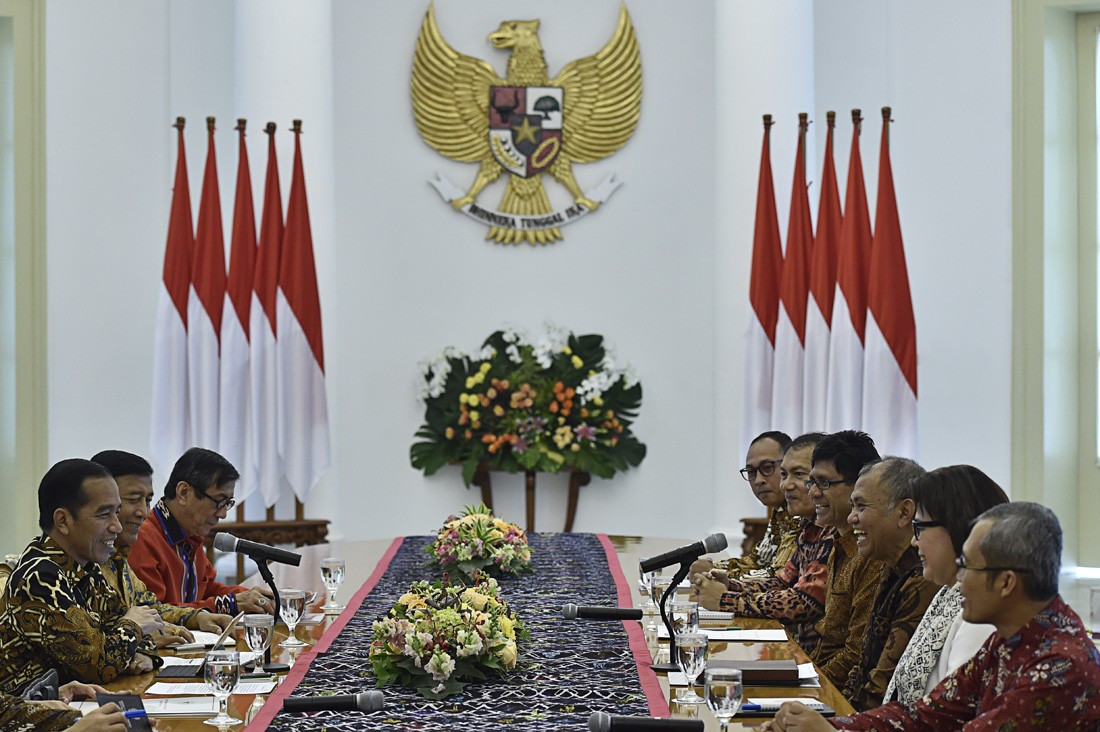Popular Reads
Top Results
Can't find what you're looking for?
View all search resultsPopular Reads
Top Results
Can't find what you're looking for?
View all search resultsNew hope in graft fight
KPK would join the government in its policy planning stages as well as in the coordination of a wide array of anticorruption measures.
Change text size
Gift Premium Articles
to Anyone
 Fighting corruption: President Joko "Jokowi" Widodo (left), accompanied by Coordinating Political, Legal and Security Affairs Minister Wiranto (second left) and Law and Human Rights Minister Yasonna Laoly (third left), meets with Corruption Eradication Commission (KPK) chairman Agus Rahardjo (third right) and KPK commissioners Laode M Syarif (fourth right), Saut Situmorang (fifth right), Basaria Panjaitan (second right) and Alexander Marwata at the Bogor Palace on July 4. (Antara/Puspa Perwitasari)
Fighting corruption: President Joko "Jokowi" Widodo (left), accompanied by Coordinating Political, Legal and Security Affairs Minister Wiranto (second left) and Law and Human Rights Minister Yasonna Laoly (third left), meets with Corruption Eradication Commission (KPK) chairman Agus Rahardjo (third right) and KPK commissioners Laode M Syarif (fourth right), Saut Situmorang (fifth right), Basaria Panjaitan (second right) and Alexander Marwata at the Bogor Palace on July 4. (Antara/Puspa Perwitasari)
B
uried beneath banner headlines on the 2019 presidential election and preparations for the upcoming Asian Games last week was a news item that on the surface sure looks like a real snoozer: President Joko “Jokowi” Widodo signed a new presidential regulation, his 54th this year.
If anything, the new regulation is a typical bureaucratic solution to any problem under the sun, in that the government decided to add another layer of bureaucracy to solve the endemic corruption plaguing the country.
The only twist this time is the Corruption Eradication Commission (KPK) is added to the mix and for the first time since its establishment, the antigraft body is now part of the government’s effort to crack down on corruption and it will join other government agencies — including the Executive Office of the President, Home Ministry, the National Development Planning Agency (Bappenas) and the Administrative and Bureaucratic Reform Ministry — in carrying out antigraft measures.
What matters more to the KPK is that under Presidential Regulation (Perpres) No. 54/2018, it would join the government in its policy planning stages as well as in the coordination of a wide array of anticorruption measures.
Coordination has not been this government’s strong suit and coordination in the fight against corruption has been abysmal. In fact, rivalry has been a common problem among government agencies in dealing with corruption.
The National Police have unveiled their plan to set up a special detachment (Densus) to combat corruption. National Police chief Gen. Tito Karnavian said there would be no overlap between the works of their Densus with that of the KPK, given that the latter has been in charge of dealing with major corruption cases and the former will only handle minor corruption cases.
Responding to the police’s move, the Attorney General’s Office (AGO) said it would revitalize its own special task force to combat graft. Then there are inspectorates general that are attached to individual government institutions, both at the national and local levels, which work independently of each other.
The new regulation should put an end to the mess. The presidential regulation mandates that any efforts to prevent and crack down on corruption be taken by government agencies both at the national and local level should be made consistent with the KPK’s anticorruption drive.
Although the new regulation does not explicitly mention that the KPK would lead the way in graft-busting campaign, Presidential Chief of Staff Moeldoko said the agency would play a key role in coordinating and overseeing the government’s effort.
Areas targeted by the new regulation are state finances, governance and licensing and law enforcement, which basically cover all areas in the bureaucracy most-plagued by graft.
And coming from a result-oriented president, the new regulation also has a clear timeline on how targets should be achieved. The Perpres mandates that three months after it is passed, a national team must coordinate the government’s overall antigraft campaign, submit a report to the President and publish reports on its progress.
The progress report should be made every three months. All this sounds like progress in the fight against graft.









